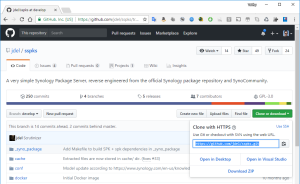There is a really excellent project named SSPKS available here to host your own SPK Server on your NAS.
Click to Read More
Pre-installation
To install it, you will need several other things first :
- Git, to be installed as explained here.
- Composer, to be installed as explained here.
Get the sources
Now, open a SSH Console using Putty, log in as an administrator and enter the root mode.
Look for the Git URL of the SSPKS project : https://github.com/jdel/sspks.git

In the SSH console, type the command:
cd
git clone https://github.com/jdel/sspks.git
You should see the following output:
Cloning into ‘sspks’…
remote: Counting objects: 1443, done.
remote: Total 1443 (delta 0), reused 0 (delta 0), pack-reused 1443
Receiving objects: 100% (1443/1443), 1.31 MiB | 705.00 KiB/s, done.
Resolving deltas: 100% (717/717), done.
Checking connectivity… done
complete the source
Run the following command (it’s using the script named “composer” created as illustrated in the How to “install Composer on Synology”):
cd sspks
composer install –no-dev
It should display the following output:
Loading composer repositories with package information
Installing dependencies from lock file
Warning: The lock file is not up to date with the latest changes in composer.json. You may be getting outdated dependencies. Run update to update them.
Package operations: 2 installs, 0 updates, 0 removals
Failed to download mustache/mustache from dist: The zip extension and unzip command are both missing, skipping.
The php.ini used by your command-line PHP is: /usr/local/etc/php56/php.ini
Now trying to download from source
– Installing mustache/mustache (v2.11.1): Cloning a3f6d55996
Failed to download symfony/yaml from dist: The zip extension and unzip command are both missing, skipping.
The php.ini used by your command-line PHP is: /usr/local/etc/php56/php.ini
Now trying to download from source
– Installing symfony/yaml (v3.2.1): Cloning a7095af4b9
Generating autoload files
Next, move the complete stuff to your web site and link it with a folder ‘package’ where you will store your spk files. Here, I am using a folder in the web repository.
cd..
cp -R sspks /var/services/web/sspks
cd /var/services/web/
mkdir packages
cd sspks
chmod o+w cache
rm -R packages
ln -s /var/services/web/packages packages
In a browser, open the test page: http://<your NAS>/sspks/selftest.php
If everything is OK, copy now some spk filez in to the ‘package’ folder (I.e.: in \\<Your_NAS>\web\packages). For each spk file named XXX.spk, add:
- its logo named XXX_thumb_72.png (size 72×72)
- its logo named XXX_thumb_120.png (size 120×120)
- its INFO file named XXX.nfo
- This one can be extracted from the spk
Finally, open the main page: http://<your NAS>/sspks
Et voilà.
![]()
Leave a Reply